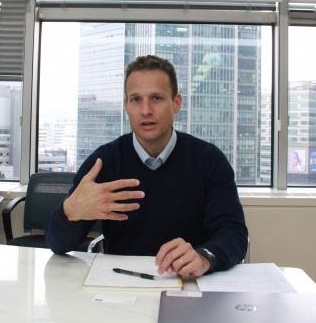“In the healthcare sector, Korea is lagging behind China.”
Julien Samson, chair of the Healthcare Committee of the European Chamber of Commerce in Korea (ECCK) and CEO of GSK Pharmaceuticals Korea, said China’s healthcare industry was growing at a surprisingly fast rate, at a news conference to mark the publishing of ECCK Whitepaper 2019 at a hotel in Seoul, Friday. He emphasized that Korea should pursue innovations and deregulations in the healthcare industry more aggressively.

Since 2015, ECCK has published a whitepaper that summarizes industrial and regulatory issues raised by its members for a year. The group uses them as a tool for dialogue with the Korean government and the resolution of industry-specific issues.
Samson called for the Korean government to recognize innovations for patients’ better access to new drugs and ease regulations to the international level, taking an example of China.
“The healthcare industry is rapidly changing around the world, but Korea does not seem to be feeling the pace of this change,” Samson said. “China is moving more aggressively than Korea to push for innovations.” Last year, China conducted 661 clinical trials while Korea had 318. This year until November, China had 658, and Korea, 208, according to Samson.
He noted that China recently introduced “fast-track” procedures to import new drugs quickly and include them in the health insurance system.
“One of the most significant changes in China last year was the introduction of the fast-track system,” he said. China simplified the reviewing process to raise patients’ access to innovative medicines. As a result, more than 40 new drugs have been included in the healthcare insurance system in April alone, Samson explained. “This happened in less than six months. But most of these drugs are not available in Korea,” he said.
Samson said he used this example to claim that Korea was lagging behind China.
Even though Korea recently removed a clause in the law that used to discriminate against foreign companies, the problem was that other regulations emerged. Those rules neither benefit Korean firms nor foreign ones, he added.
In the Korean healthcare industry, he proposed removing double certifications, double tests, and dual criteria in drug approval review or drug reimbursement review, Samson said. “Double procedures raise the cost only and do not make products safer or better,” he added.
At the press conference, ECCK also presented regulatory issues in 20 industries, including automotive, healthcare, chemicals, food, insurance, logistics, and transportation, which were included in the 2019 Whitepaper, and 180 recommendations to the Korean government.
The Healthcare Committee presented recommendations to the government on 33 issues. They include improving the standards for combination drugs, expanding the scope of risk-sharing agreement to increase patient access to medicines, discussing VAT issues on risk-sharing agreement refunds, improving duplicate quality inspection tests for imported vaccines and pharmaceuticals, and giving KC certification to repair parts for medical equipment.

